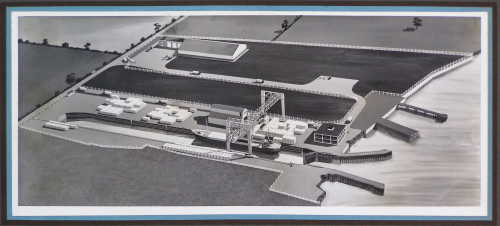On the job with Brian Lee

You will (hopefully) have seen some examples of my paintings and drawings on Starts At 60, but I haven’t finished with you yet. The art I have already shown is the stuff I have done for the pleasure of doing it, but there is another side to me. You see, I have been a professional artist/illustrator/photographer since about 1952 and until I retired in 1996, very little of my work was just for pleasure. I had to make my living at it. I’m here to show you just a few of the many pieces of illustration work I did during that time.
- The Welsh Dock was a gouache painting I produced for a developer who needed to illustrate the site before it had actually been built, for sales purposes. I had to draw this, working from architects drawings and plans, because the site was just open fields at the time.

- I did a lot of Work for Avon Rubber, the Company that made all the tyres, factory fitted to Rolls Royce Cars. They also produce a lot of equipment for the military as well. This design was for a poster, 6 feet by 7 feet, for use in an exhibition of Avon items, diving suites being just one of many.

- This is a picture of something that could never exist. It is a massive, nine foot diameter mesh filter, but my drawing shows in one shot, all the variables available, for the differing purposes the item can be put to. The only other way to have shown this variability would have been to have five separate photos, which the client agreed with me would not have been as impressive as amalgamating them all into this one, impossible filter.

- Many objects, when photographed, don’t look so good. This is because it is often impossible to light a subject adequately, so important parts may be lost in shadow. That’s where the photographic retoucher comes in, brightening everything and making it more visible. Today, with digital photography, this sort of work is done with Photoshop.

- This is an example of the same problem as the wheelchair above, so no further caption is necessary.

- This is a painting of a large office building in Melbourne, being offered for sale. As with the wheelchair, there is a much better opportunity to show the place off to the best advantage in a painting, plus of course, artistic licence can be used to omit trees, parked cars and other items that could spoil an actual photo.

- Another building painting, for a Real Estate Agent in Port Albert.

- This is a design for a logo for a company selling office furniture. My brief was to design a logo that would clearly announce the business the company was engaged in, but would not have identifiable pieces of furniture in it. Hence, I designed this. Obviously office chairs, but too blurred to be recognised by a manufacturer or a customer.

- This is hardware house in Melbourne and the caption to number six above also applies to this piece of work.

- Another logo design, this time for a cabinet maker. He wanted a design that suggested good, old fashioned craftsmanship being used to manufacture his product, this was the result.

- Finally, I was commissioned to produce an illustration for a magazine article, entitled “The Way The West Was Won?”, which queried whether all the Western films made in Hollywood were accurate in their assessment that apparently the only rule of law there, was by the gun, when in actual fact it was settlers and farmers who actually made the great country work. Cowboys and Indians in fact, were a very small part of the overall story.
I hope I haven’t bored you with this little exhibition of my commercial work. Many people don’t realise the amount of artistic work that has to go into virtually everything that gets printed. Even the simple invoice you receive from your newsagent or electricity company has first to be drawn up by someone like me, and then photographed so that it can be transferred onto printing plates attached to a large machine. And every page in a glossy magazine is done in exactly the same way, there are no short cuts, except that most stuff has now gone electronic, but the result is unchanging.









 Proudly Australian owned and operated
Proudly Australian owned and operated